 Vampire Weekend's Surprising Jewish Stories
Vampire Weekend's Surprising Jewish Stories
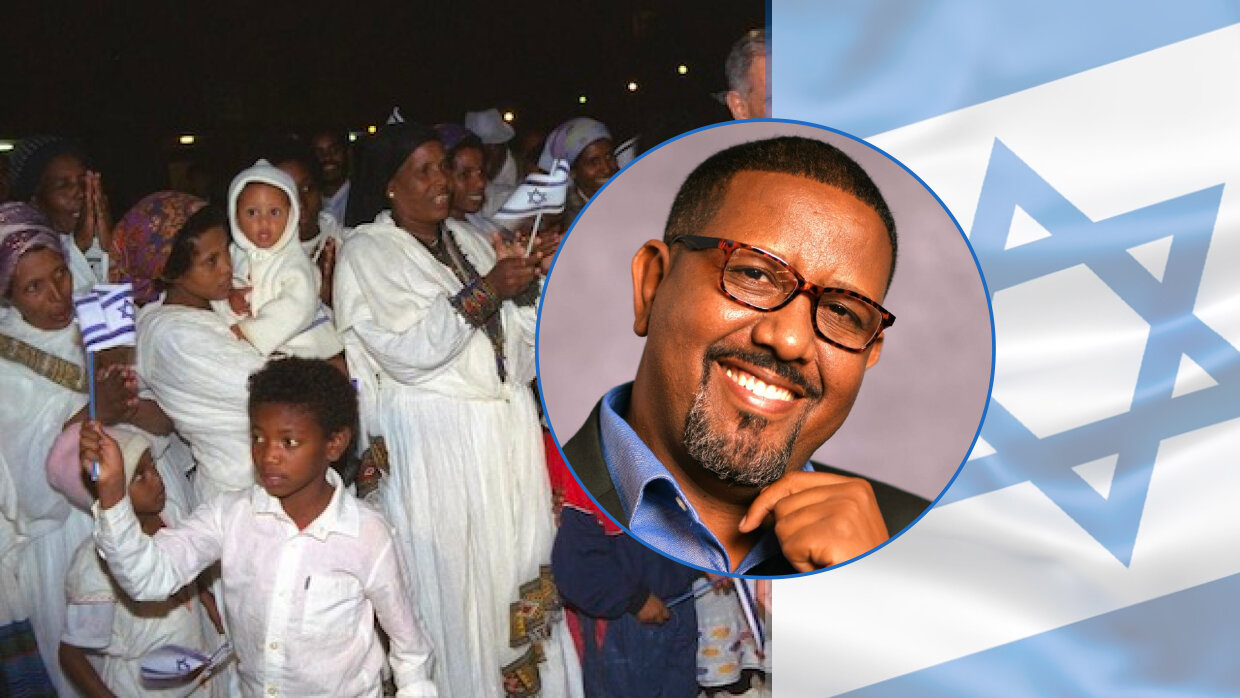

8 min read
Shai Fredo, an Ethiopian-Israeli actor, was airlifted out of Sudan and brought to Israel by the Mossad.
Shai Fredo was born in Matcha, a beautiful village in northern Ethiopia, with no electricity or running water. Their closest neighbor was a mile and half away.
Fredo’s family had roots in Ethiopia for 2,500 years and they desperately longed to see Jerusalem. Keeping a connection to Judaism and Israel was a driving force behind every aspect of their day. They spoke of Jerusalem daily. As a young child, Shai’s first word was “Jerusalem,” something he said even before his own name.
“The importance of Jerusalem and Judaism was engrained from a young age. Ethiopian Jews were living for 2500 years in same country and in the same place. Each father shared the importance of Jerusalem and Judaism with their son directly. We were not like other Jews that kept moving and therefore lost traditions.”
But the borders of Ethiopia were closed and anyone who was caught escaping was thrown in jail and had their land confiscated.
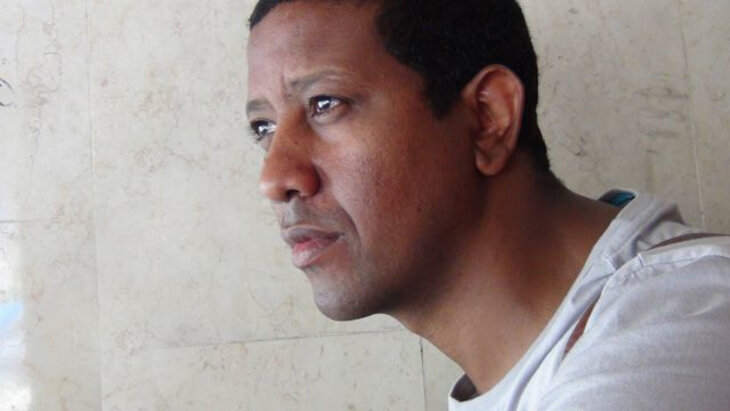
Shai was seven when his family heard that Sudan opened their border for refugees. They grabbed the lifeline and immediately escaped. “We heard this opportunity that the Ethiopian border was open, so we left everything behind and just ran to get to Jerusalem,” Shai said in an exclusive Aish.com interview.
“I only knew we were leaving for Jerusalem two hours before we left. My parents did not want me to tell my Christian friends at school because no one knew we were Jewish. It had to be completely secretive. My dog stayed behind because it would be dangerous to take him with us. I cried so hard and promised I would return for him.”
The Fredo family traveled with their extended relatives in a group totaling 400 people. The ages ranged from his one-month-old sister to his 97-year-old grandfather. They walked for an entire month to get to Sudan, leaving behind their ancestral home of thousands of years and risking their lives for the possibility of getting to Jerusalem.
“We were not like other Jews that kept being exiled from country to country. For 2,500 years we lived in the same country, in the same place. There was a lineage each father promised to each son, that they would one day see Jerusalem.”
During their journey, it was imperative for them to keep their Jewish identity a secret. Shai and his family walked through forests in the middle of the night. “After the first week, the first band of robbers came to get us and they took our money and jewelry. After a few days, another group of robbers came. This group took the horses and donkeys and food. They told their friends about us. When there was nothing else to take, they took children or women.
“Everybody cried. I hugged my mother and said, ‘Mommy, mommy let’s go back, Jerusalem will wait for us.’ She just cried and hugged me and said, ‘Everything will be all right.’
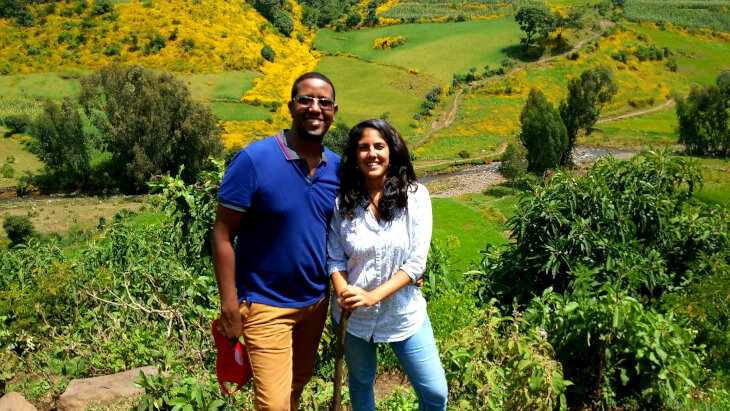
“People disappeared in the forests, never to be seen again. I do not know if anyone in my family was raped. No one spoke about it. One of my uncles’ daughters did disappear, but she was found at a later point. The robbers also kidnapped my grandfather and the horse he was riding because of his old age. My father chased the robber with his gun and brought him back.”
At one point, Shai’s family assumed they would all die in the forest. Miraculously, a random man appeared and protected them from all the robbers. “He said, ‘This is my area, this is my place, and my land. Leave them alone. I will not let you hurt them.’ The robbers never returned.”
They started their journey with 400 people. They arrived in Sudan as a group of only 80, joining 12,000 other refugees. Each had to pretend to be Muslim so the Sudanese police would not send them back. They assumed that they would only be there a few days, but days turned into a full year.
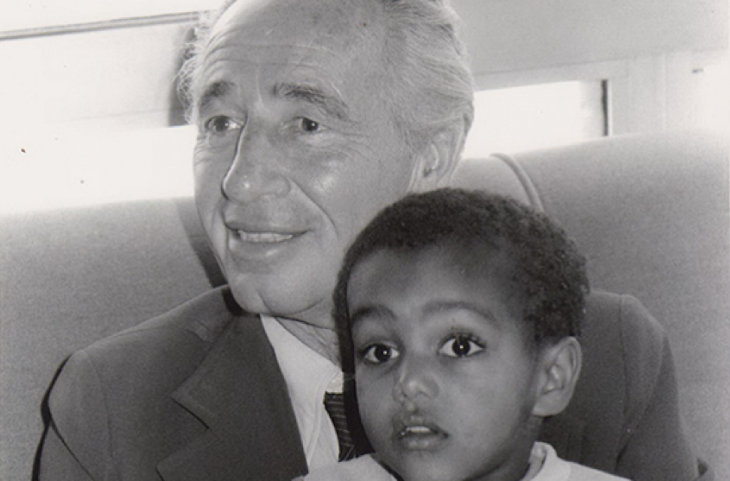 Then-Israeli prime minister Shimon Peres with a child brought to Israel in the 1984 Operation Moses, which brought Ethiopian Jews to Israel (Defense Ministry Archives)
Then-Israeli prime minister Shimon Peres with a child brought to Israel in the 1984 Operation Moses, which brought Ethiopian Jews to Israel (Defense Ministry Archives)
Operation Moses, as it was called, required the Mossad to send agents to talk to the refugees. They would ask specific, targeted questions to determine who was Jewish. “We understood that Mossad agents who were originally from Ethiopia had entered the camp because they began speaking words that only other Jewish Ethiopians would know. They eventually gave us a sign that it was time to leave.”
Four buses arrived one night to bring the Jews to airplanes to get to Israel. Getting on the bus was a madhouse. Shai’s family did not make it on the first round of buses, or the second.
“There were thousands of people, and everyone was trying to get into those buses. My brother, who was only 10 years old disappeared and got onto the first bus. We were lucky because my uncle saw him get into the bus from the window. My mother was crying with joy. She was so happy that at least one of us would make it to Israel.”
It was calmer the second time the buses arrived. They took only the women and elderly, including Shai’s mother and little sister.
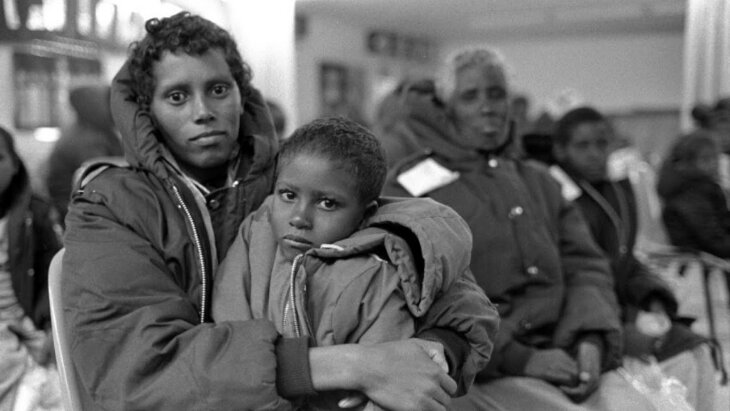 Ethiopian Jews who arrived on Operation Moses
Ethiopian Jews who arrived on Operation Moses
Shai and the rest of his family finally made it on the third round of buses. When they were on the buses, they realized the neighbor in the tent next to them was also Jewish. They were together for an entire year and never knew because it was dangerous to reveal their Jewish identity.
“The Mossad must have paid a lot of money to the Generals in that area. If anyone found a Jewish family, they would snitch and that family would disappear. No one would know where they went. To be Jewish was a dangerous thing.”
Once Shai and his family were settled on the buses, it was extremely quiet.
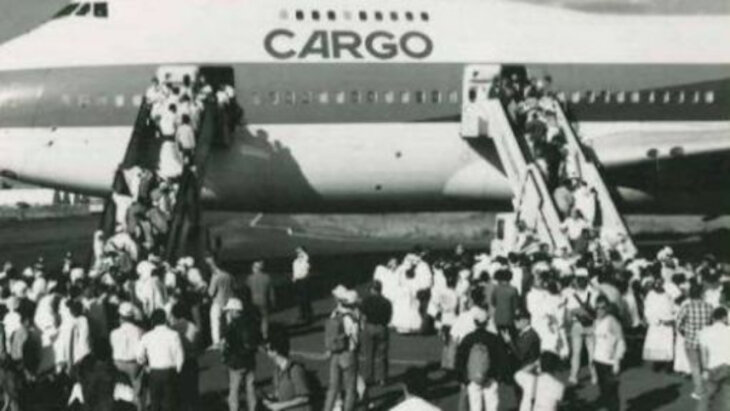 Operation Moses
Operation Moses
“There were hundreds of people, but no one said a word. Babies did not even cry. It was silent. We drove in the desert to meet the plane. The Sudanese soldiers stopped the bus, and some people got out and paid money. All the windows were closed. There were lots of children, but all were silent. We knew our lives depended on it.
“Once we got off the bus, I told my father, ‘Daddy, I want to get my shoes. I left them on the bus!’ ‘Don’t worry about your shoes,’ he reassured me. ‘We are going to Jerusalem.’”
The plane ride was only one hour. It was a dream come true. Shai remembers as an eight-year old sitting on the plane and pushing the chair in front of him, thinking it would make the plane go faster.
His challenges did not end upon arriving in Israel. He was shocked that a Jewish person could we white. He asked his father, “Will I grow up and become white?” Little did he realize that some Israelis had biases towards people of color and it would later present problems when finding work as an actor.
Being an Ethiopian Jew presented its own set of issues. He wanted to be an actor, even though his mother did not support his desire. It was very difficult finding work in the Israeli entertainment industry. But Shai was determined and worked hard to achieve his dreams. Only after Shai became an acclaimed actor and director did his mother support his choices.
Shai went to high school and Yeshiva in Holon. He served in the army for three years and was the personal assistant to a Special Projects officer.
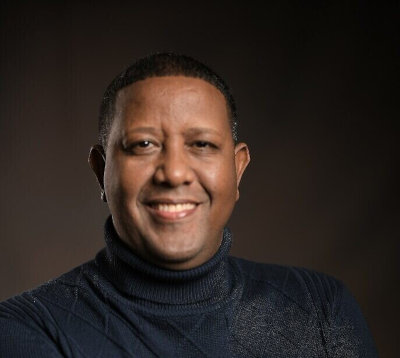
After the army he approached his parents and told them he wanted to be an actor.
His parents responded with shock and urged him to do something more mainstream.
He replied with passion, “I want to be an actor because I have a story I want to share with the world.”
He studied acting, voice, movement, and playwriting at The Visual Theatre School in Jerusalem.
Later, he was admitted into Israel’s prestigious Nissan Nativ Acting School where he trained for 15 hours each day to perfect his skill. Despite his hard work and effort, (he graduated with honors), Shai struggled to land roles because of the country’s racial bias at the time.
Instead of waiting for society to change, he created that change himself. He opened the first Ethiopian acting group to give other Ethiopian actors like himself a chance to act in mainstream film and TV.
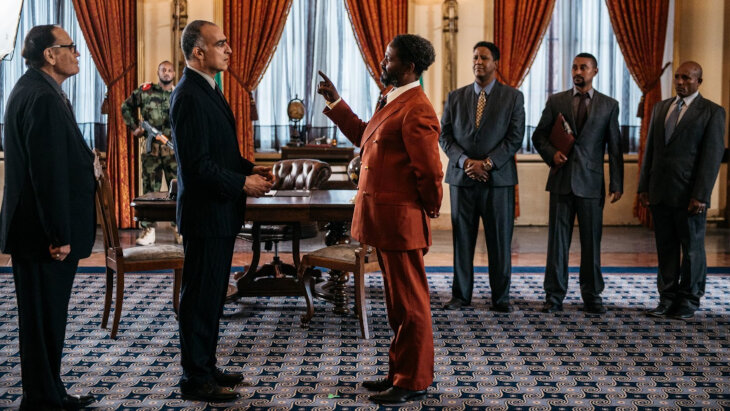 Shai in Exodus ‘91
Shai in Exodus ‘91
Shai began landing larger roles and even starred in a few shows he wrote himself. The Lion of Judah is a one man show about his life’s story. He played a featured role in the Jewish festival favorite Exodus ‘91. His experience with Operation Moses helped him with his role in the film. “Exodus ‘91 depicts Operation Solomon, another covert operation to bring Jewish here are still thousands of Jewish people in Ethiopia.”
Fredo is the founder of Natella, the first Ethiopian theater in Israel. He is also the creator of the Ethiopian festival Sigdiyada. He hopes to create a film about his own experiences.
Shai and his family overcame unthinkable challenges to come to Jerusalem, a dream they held unto for 2,500 years. Today he is a proud resident of his homeland’s capital.
